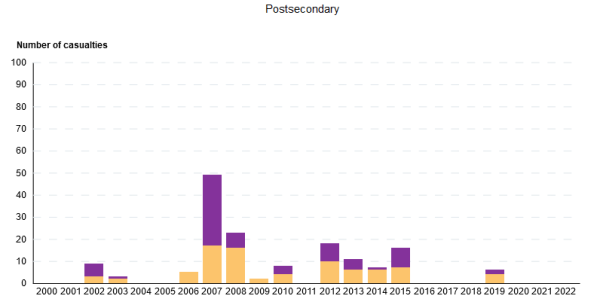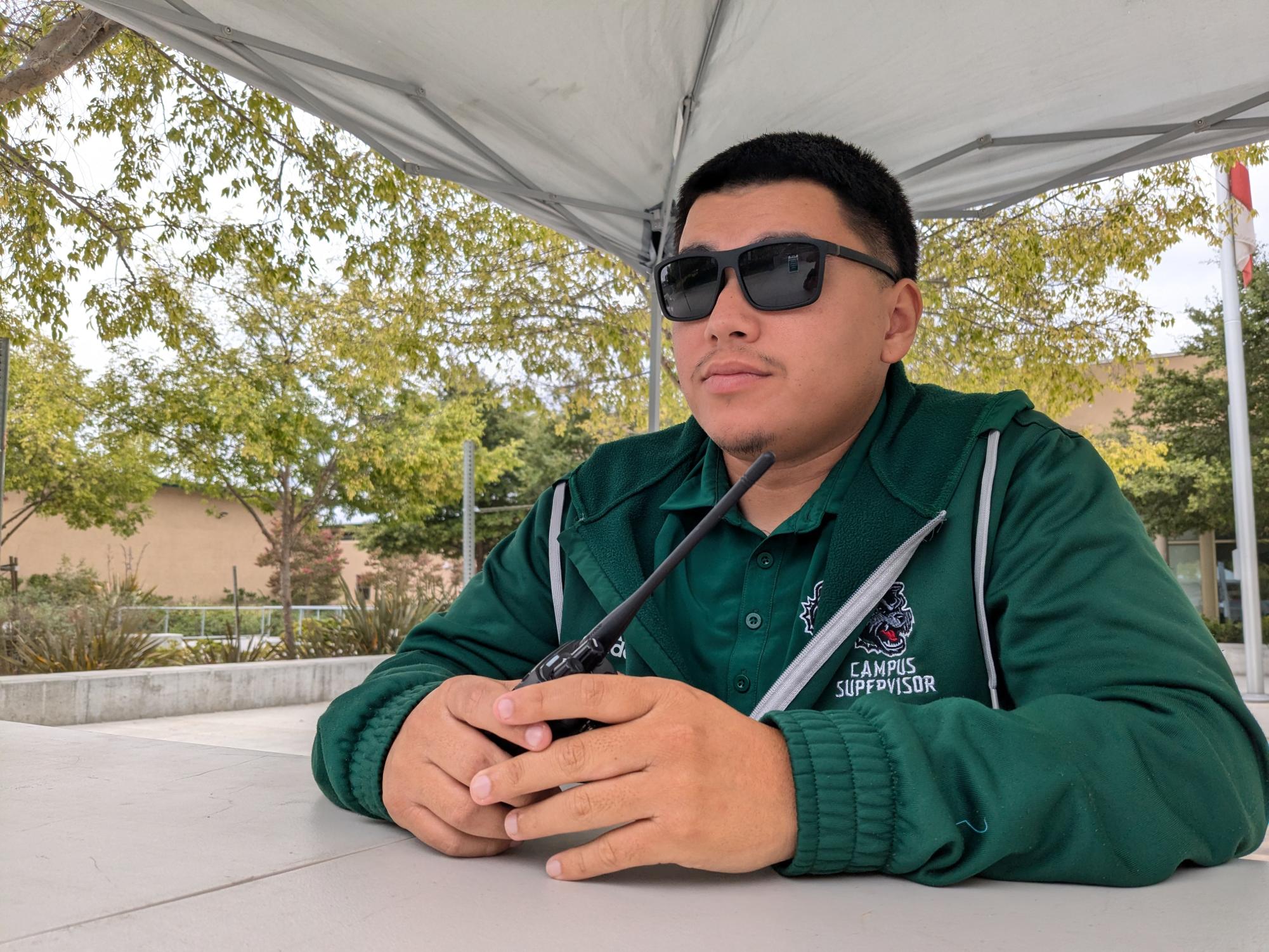For some graduating seniors, including myself, 2007 is looked upon fondly as our birth year. Thankfully, we weren’t old enough to remember that 2007 was marked with the highest number of school shootings on college campuses in the past two decades- the same campuses we’ll be on in less than a year. As of late, the safety of schools and the people within them has come into question. As we move forward with our future college decisions, it’s difficult not to worry about just how safe our campuses are.
A report done by the National Center for Education Statistics confirmed that, between the years of “2000 through 2022, there were a total of 328 casualties (131 killed and 197 wounded) in active shooter incidents at elementary and secondary schools.” An additional “157 casualties (75 killed and 82 wounded) [occurred] in active shooter incidents at post-secondary institutions,” the report states. Again, as seniors soon to head off to college, many of us find it hard not to consider the worst possible scenarios and data like this when it comes to our education, and our safety in pursuing it.

This begs the question: with all of the horrific incidents happening around the country, here at Helix, do our soon-to-be college-faring students feel safe on their own campus? Do the teachers feel safe? And what are the faculty doing to ensure this safety?
To start, I interviewed a well-known Helix staff member to gain a deeper insight and another perspective from the people who work here. This past Tuesday afternoon, Jonathan Simon sat down with me to talk about campus safety. Simon is the school’s Director of Safety- and while many students will recognize him as a frequent golf cart driver, his actual job, in his words, is the “safety and security of students, number one,” and number two was stopping “anything negative from taking place on campus.”
With ten years of experience at the San Diego County Sheriff’s Department working as a Crime Prevention Specialist, Simon works with other staff members such as Lauren Knuth, the Communications Director, and Ken Britschgi, the Manager of Facilities, to implement decisions that help keep students safe. The lock-block on the door behind us, he pointed out during our interview, was one of them.
“It’s a big change,” he affirms. “All the classrooms are in the locked position by default, and when the lock-block is engaged, it allows the door to remain ajar. The question is, well, why is that necessary?” I shrugged and asked him why. In turn, he responded with a hypothetical:
“Say the door’s unlocked, and you don’t have that little thing,” he says, pointing to the lock-block, “you can’t lock the door. And yeah, if you do have a key, now you’ve got to go outside the door. If you’re a substitute teacher, you might not even know what you’re doing or where the key is.”
He told me that, in such a tense situation, even seemingly minuscule things like using or finding a key cost precious time that’s better spent elsewhere. That’s why the lock-blocks were implemented- to simplify it all by just leaving the doors locked and moving the plastic door stopper to the side. It’s little decisions like that, which he pushed throughout the interview, that contribute to the school’s safety overall.
While writing this article, I didn’t just interview Simon- I also interviewed a few of my peers for their takes and opinions on school safety. However, during my conversation with Simon, he emphasized more than a few times that the school still had areas where it needs to improve. When I asked where, he told me that one of the big changes they’re “in the process of making, now, is an emergency notification upgrade.” Coincidentally, Hayley Dunkel, a senior whom I interviewed just a few hours prior, informed me about a lock down in which that ‘emergency notification upgrade’ could have come in handy.
“Have you ever felt threatened or endangered here on campus?” I asked her.
“Maybe a little bit during the lock down that was, like, two years ago,” she recounted, “just because I didn’t know what was going on. I was in the library because my classroom was already closed, and so I was like, ‘oh God, let me just hide in here.’
“Then,” she continued, “ I didn’t find out what was happening until my dad told me because he got an email before I did with information- which I was kinda confused about, because I wanted to know what was happening.” She further described to me how, in that instance, the sheer lack of information in a possibly life-threatening situation only made an already stressful event much worse.
I told Simon about this, and he seemed both surprised and glad that I had mentioned it. “Okay, yeah,” he said, nodding. “So from those scenarios, we learn a lot, right?”
He informed me that communication is an area that they’ve been striving to improve in. Knuth, he said, could now “immediately pull up the emails that I know she has saved on her devices and begin to communicate with parents- as close to real time as possible- because it’s so important that we communicate and let people know what’s going on.” Using technology to do things better, he says, like with emergency notifications, is a step they’re working on taking, and one they’re trying to improve on- but it will definitely take some time.
On the other hand, the students I interviewed had more concerns than just emergency communications. When I asked some seniors if they had noticed anything on campus that could be a problem safety-wise, one told me that she saw a spot during a football game where someone had opened up the fence, and anyone could walk in. Another student recalled how, even with the new gates, she once witnessed a car speed through faster than a security guard could stop them.
“I worry about it all the time,” another senior said, after I asked her if she was worried any incidents might happen. “All the time. All the time,” She repeated. Both unfortunately and unsurprisingly, all of the students I asked told me they were at least somewhat worried something might happen. Despite this, all of the students I interviewed rated their feeling of safety on campus an average of eight out of ten. In fact, so did Stephen Honda, better known by students as Coach Honda.
“Most definitely,” He replied confidently, after I asked him if he felt safe on campus. “With the amount of campus supervisors we have here every day, and how visible they are, seeing them around campus and how quick they respond to things- I feel like, for the most part, it feels like we’re in good hands. We’re protected.”
When I asked him why he didn’t give it a ten, he told me it was because he knows Helix can do better. “A lot of times, it isn’t in their hands,” he added. “That’s why they call La Mesa PD, right?” Regardless, his rating remained somewhere between an eight or a nine, as he maintained confidence that the school is doing everything it can to keep its residents safe.
When I asked him, as an employee, how he felt seeing other schools’ incidents, he admitted that there’s both ‘uncertainty’ and ‘uneasiness’ when he sees it on the news. “I don’t know if we could get through it without anything going down,” he concluded, very evidently unsure. And, it wasn’t just Honda who worried about the uncertainty of it all- as mentioned before, the students I interviewed all had their doubts as well. I figured this would be the case, so back during my interview with Simon, I made sure to ask him if he thought the students’ and staff’s concern for safety was valid.
“Absolutely. 100%.” He put it very bluntly. “And the more students that can share about whatever their concerns or ideas are, bring it.” His door is always open, he said, and he invites anyone with concerns to reach out through his email- [email protected].
What’s reassuring about this fairly bleak topic is that the students and school seem to be on a similar page. The worries that my peers have are ones mirrored by faculty, who even have their own uneasiness about the dreadful situations we keep hearing about. Thankfully, people in charge of these decisions, like Simon and his colleagues, are working to quell some of these worries. In addition to the technological upgrades, Simon is still pushing for better fencing and other solutions that, he believes, will ease students’ minds. It is important to note, however, that some of these are long term projects, and may take time to implement. And, no matter how secure the school is, many within it will still have that fear in the back of their minds.
Thinking back on this, I’m reminded of something Simon told me towards the end of our conversation. “I hope that they feel safe,” He said during our interview. “And I don’t just want them to feel safe- I want them to be safe. That’s the thing, right?”
If you want my opinion, there probably isn’t anything the school could do to make the fear or the threat completely disappear- but from talking to staff and people around campus, everyone gets the impression that they’re trying their hardest. I would have to agree. We’re never going to be perfect, but with all the effort (and 1.6 million dollars) put into safety here, some peace of mind can, at the very least, be found in knowing that our school hears both the threat and us.
In the almost four years I’ve been here, we’ve avoided any serious or life-threatening incidents- and, to my knowledge, many more years before that, as well. If you’d like to help ensure that continues, Simon reiterated several times during the interview that if any student sees a possible security threat- anything at all- they should report it to the student safety hotline, found at this link, or by going to the Helix website’s ‘School Safety & Security’ page and selecting ‘Student Safety Hotline.’




